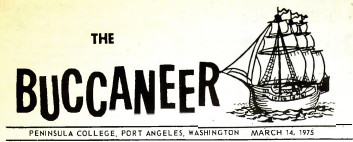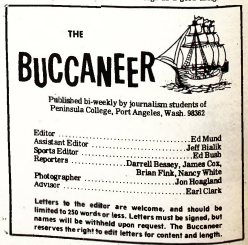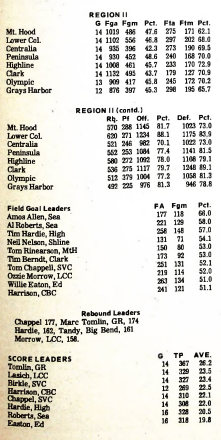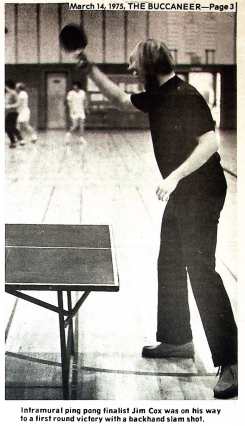
40 acres donated to forestry dept.
By BRIAN FINK
The donation of 40 acres of
land to the Peninsula College
forestry department by T.A.
Conrad will have no marked
effect on enrollment, according
to John Willits, program
instructor.
“We’re pretty static in our
enrollment. Other colleges in
the northwest have expanded
their programs, and graduates
have found there is no job
market. We try to keep
enrollment to a reasonable level
because of this.”
Mr. Willits does anticipate
that the land, which has been
recently logged, will have a
beneficial effect on the
department.
“The land will be used for
regeneration studies. We have
an ample opportunity to look at
forested lawns, but this is a rare
opportunity to see what we can
do with a piece of high site cutover land,” he said.
The acreage, which is located
south of highway 101 on the
Soleduck River, was recently
logged and will be replanted by
the forestry department early
this spring. The students will be
paid approximately three cents
per tree for the reforestation
project. Total earnings for the
students will be approximately
$100, to be distributed among
those involved.
The land was donated to the
Peninsula College Foundation,
a group of citizens within the
community dedicated to the
interests of the college, by Mr.
Conrad, of Sappho.
With the exception of a brief
stay in Alaska, he has been a
resident of the Port Angeles
area all his life. He purchased
the Sappho land in 1938, and it
has remained untouched until
recently.
Conrad was afraid that after
his death the land would be sold
and its natural beauty
eventually destroyed. He felt
that the college would use the
property in a worthwhile
fashion.
There will be no cost involved
in the transaction, but there is a
possibility that the Foundation
will have to pay real estate
taxes, Mr. Maier told the
Buccaneer. An assistant
attorney general will be at the
college soon to determine if the
Foundation will have to pay
these taxes.
Kiosk replaces sandwich boards

The new addition to the PC
Campus is a round sign board,
or kiosk.
The kiosk replaces the old
sandwich boards that used to be
scattered around the campus,
and was built by Bob Johnson
and Dick Lorentzen of the
maintenance staff, According to
Lorentzen, the kiosk is built of
plank plywood construction, is
hollow and self ventilating.
The kiosk provides a central
bulletin board and hopefully
will rid the campus of the
clutter of signs posted on the
college buildings, added
Lorentzen.
State-local govt
Spring schedule announced for Studium Generale
The Community Services
Committee has announced the
spring schedule for Studium
Generale.
The first lecture of the
quarter will be April 3 and will
present Earl Clark, PC
journalism instructor and “A
Pictorial History of Britain—
from Stone Age to Jet Age.”
Other April lectures include
Mr. Ishwar C. Puri “Levels of
Human Consciousness,” April
10; Mrs. Margaret Holm
Spillane, “Literature
Illustrated”, April 17; Dr.
David Andre and John Pogany
“Art and Music: Passage
Through Time”, April 24.
By popular request Rabbi
Raphael Levine will return May 1. Rabbi Levine will speak on
“Religions of the World” or
“Freedom Under Law in
America.”
Also in May will be Ross
Hamilton, “Olympic Alps:
Backpacking Through the
Seasons,” May 8; Mrs. Bonnie
Graves, “Jewish Music:
Liturgical and Folk”, May 15;
Mrs. Rosemary Brauninger and
Mrs. Thelma McCoy, “Concerto
for Two Pianofortes” May 22;
and Ross Maloney “The
Psychology of Economic
Conditions”, May 29.
William Lucas will speak on
“Classical Japan” on June 5 to
complete the lecture series.
All lectures will be Thursday
noons in the Little Theater.
Admission is free with Studium
Generale card. Single
admissions (without Studium
Generale card) will be $1.
In addition to the regular noon
lectures, special Tuesday
programs may be offered as
make-up credit for the course.
Programs being considered for
Tuesday noons include:
Edward Tisch, “Report on
Chile: With the Peace Corps in
Chile”; Gerald Monson, “A
Rebuttal to the Theory’ of
Evolution”; Dr. Ray Duncan
and Dick Hendry, “Career
Planning for Tomorrow”.
According to Dr. Quast,
Studium Generale coordinator,
the Community Service
Committee has discontinued the
video-taping of the Studium.
Generale programs. It will no
longer be possible to make up
lectures in that manner.
Grading is based entirely on
attendance, and Studium
Generale credit will satisfy
elective credit requirements for
graduation and transfer.
Winter quarter Studium
Generale broke records for
attendance, with more than 270
students enrolled.
State-local govt. to be offered
Offered once every two years,
the American state and local
government course, Political
Science 205, is scheduled for
spring quarter.
Dr. Werner Quast teaches this
five credit, seminar course.
Extensive field trips to observe
state and local government will
replace some of the hourly class
sessions.
“The course is intended to
show the student how
government works and how he
can best observe and analyze
this political process,” said Dr.
Quast. “Usually the number of
students has been around 12 so
that the special research
projects can be conducted in an
effective, personalized
manner.”
Special projects will include
observations of local boards,
commissions and their
functions; analysis of the
legislative process; and
interpretation of “Sunshine”
laws such as open meeting acts,
administrative procedures acts,
and the public disclosure law.
The prerequisite for the
course is Political Science 102 or
special permission of the
instructor. It is scheduled to
meet daily at 2 o’clock.
Bookstore buyback March 18
Students looking for money so
they can leave town during
spring break are invited to
resell their used books to the PC
bookstore March 18.
The sale will take place in the
bookstore from 8 a.m. to 3 pun.
Only those books which will be
used for courses offered spring
quarter will be bought. Lists of
the books to be bought are
posted around campus as well
as at the bookstore.
Students will be able to resell
any of their books purchased
this year at the year-end
general buyback June 12.
Conversion planned for lab
Plans are underway to
convert the present ceramics
room into a room to
accommodate both music and
drama departments.
The ceramics room will be
moved from the fine arts
building to the new art building
addition which will be
completed in August.
According to Ross Maloney,
head of the faculty planning
committee, the room will
provide rest rooms, dressing
rooms, and a place for set
building, prop storage, and
music storage. It will also be a
music classroom for the choir.
Mr. Maloney says there are
two opposing plans. The
committee will come up with a
general plan after assembling
its ideas, then have an architect
work out the details.
“How much funds are left
after completion of the new art
wing will determine what gets
done,” he said. “We’ll do as
much as we can with the money
we have.”
Others on the committee are
Marvin Pollard, Marjorie
Avalon, James Lunt, Laurence
Welch, Kent Brauninger and
Margaret Spillane.
Editorial
Is team worth it?
Following the end of the basketball season, there
has been some speculation concerning the relative
worth of the girls’ basketball team. After consideration of its win-loss record, the suggestion was
made to drop the program from the budget.
If a team’s win-loss record is the main criteria for
determining its value to the school and the need for its
inclusion on the athletic budget, then the varsity
basketball team has little room to talk.
After its perfectly even 12-12 record last year, they
dropped one further this year with an 11-13 record.
Somehow that doesn’t appear to be an improvement,
even though the Pirates did finish higher in the league
standings.
To be truly objective, it is necessary to examine
more criteria, such as attendance, learning experience, and athletic advancement.
A team doesn’t have to pack the gym with people
every game to prove its value to the school and
community, but if the attendance is consistently below
50 per cent of the capacity of our small gym, there is a
problem.
The participants in these sports are exposed to
numerous learning experiences involving the game
itself, human relations and sportsmanship.
If, after full consideration, the girls’ team is seen to
be lacking, then action should be taken. Until then,
people shouldn’t be quite so quick to criticize.
—Ed Mund
A look at the artists
Dance group goes mod
By JEFF BIALIK
I remember a time when
someone told a joke and
everyone laughed except me,
because I did not understand
the punch line. This is precisely
how a non-dancer reflects upon
and reviews a performance by
the American Contemporary
Dance Company, as an outsider
cancer when he wrote the poem.
A Dakini is a Tibetan deity,
usually of female gender, that
has the ability to transform
herself into any personage she
wishes.
The final selection was
“Improvisation”. And it was
just that. The audience seemed
for bringing in such a variety of
unusual, interesting, and
educational productions.
Watching the American
Contemporary Dance Company
I found that understanding isn’t
a prerequisite for enjoyment,
just as price isn’t a prerequisite
for value.
looking into a bakery, watching
as all the ingredients mix
together for the next morning’s
special, yet having to leave
before he sees the finished
product.
The Tuesday evening
performance of the American
Contemporary Dance
Company, on March 4, was
quite a spectacle. Under the codirection of Joan Skinner and
Robert Davidson the group of
students performed with
exceptional poise and
confidence, even if I didn’t
understand the punch line. With
the aid of the program notes,
graciously sent to me through
Mr. William Lucas by Joan
Skinner, the following was the
program.
The first selection was called
“Children of Light.” The
choreography was by Robert
Davidson, music by the
Cybernetic Renaissance Band,
and included all of the company
dancers. “Children of Light” is
a game before a magical queen,
that operates according to
intuition. Each player must
adapt himself to a constantly
changing situation. In this way
the piece utilizes the principles
of indeterminacy.
In “Collagen” Louise Durkee
performed a solo dance as
Robert Davidson sprinkled
styrofoam particles
incoherently in a comer of the
stage. There is no logical
sequence of phrasing in
“Collagen,” just a flow of pure
movement.
“Dawn Travelers” celebrates the ongoingness of
life and its mysteries. Four
dancers journey through time
not quite sure where the road is
taking them or where they have
already been. Halfway through
the journey they don masks to
honor the hallowed ground they
pass over. With the nylon
stockings their faces resemble
those found on oil paintings that
seem to be thinking of escape.
Louise Durkee and Robert
Davidson performed “RainSleep”, a simple dance for two,
bringing the audience into
another environment.
“Mountain Landscape: The
Red Dakini, the White Dakini,
the Blood Dances and the Last
Dakini”, was inspired by the
poem “Dakini Software” by J.
Giorno. The dance utilizes the
kind of imagery and movement
seen every day on television or
at the movies. The dance
seemed filled with anguish and
pain, not surprisingly, for1
Giorno was suffering from
cancer when he wrote the poem.
A Dakini is a Tibetan deity,
usually of female gender, that
has the ability to transform
herself into any personage she
wishes.
The final selection was
“Improvisation”. And it was
just that. The audience seemed
to enjoy this last selection the
best, as ideas were conceived
and perfected at the same
instant. The “Improvisation”
Tuesday evening seemed to
resemble children’s games, yet
they had no actual guidelines or
form.
The program was refreshing.
The Community Service
Committee should be applauded
for bringing in such a variety of
unusual, interesting, and
educational productions.
Watching the American
Contemporary Dance Company
I found that understanding isn’t
a prerequisite for enjoyment,
just as price isn’t a prerequisite
for value.
Former PC students ‘well prepared’
Former Peninsula College
students now attending the
University of Washington feel
that they were “prepared well
to compete and survive in the
large school,” according to Dr.
Ray Duncan, registrar.
He attended a conference at
the University of Washington
Feb. 27 and 28 with former
students and university
representatives, to discuss the
advantages and problems the
student has when transferring
form the community college.
“We want to become aware of
any problems in preparation
and transferring. We want to
remedy those and make the
necessary changes,” Dr.
Duncan said.
There are about 70 former PC
students there now. They
represent a wide selection of
majors and academic levels.
The overall G.P.A. is close to
the avarage of all other transfer
students.
“The biggest problem of
transition,” Dr. Duncan said,
“is the adjustment to city and
dorm life. It sometimes takes a
couple of quarters. The student
must use more initiative and
resourcefulness in making his
plans.” This includes finding
living accommodations before
June.
There was high praise for the
instructors at Peninsula.
“Many felt the instructors
at the university are more
impersonal. Research work is
stressed and some professors
are almost disinterested. Here
you are free to go in and talk,”
he continued.
Unlike other schools, the
university does not have a
contract with Peninsula to
automatically accept students
with their Associate of Arts
degrees as juniors. Dr. Duncan
urges students to stick to
transfer courses and make up
any high school deficiencies to
avoid problems in transferring
credits.
“The registrar’s office can
spell it out for them,” he said.
We have material showing
common problems. The student
can check off these problems
and work with their advisor to
plan a program.”
“I strongly recommend that
students take advantage of the
chance to meet with
representatives coming from
other schools. They are
specialists in helping a student
transfer. At the University of
Washington a student can get
shuttled around from office to
office trying to get answers.
These representatives give
answers,” Dr. Duncan said.
“We seem to have an awfully
good turnout at these
conferences,” he added. “It
really gives me a good feeling to
go and hearthese kind of things.
I enjoy talking to them. It’srare
to have anybody make much of
a criticism. Most see Peninsula
College as a good thing.”
Art film series coming in April
For the second year in a row,
students and residents of the
Olympic Peninsula will be able
to attend the Washington State
Art Services film series.
Titled “Museum Without
Walls” a program consisting of
five sections dealing with
modem contemporary as well
as Pre-Renaissance painting,
will be sponsored by the
Angeles Arts in Action
Association in cooperation with
the Peninsula College
Community Services
Committee.
Beginning Monday evening,
April 14, and every Monday
evening thereafter through May
12 at 7 o’clock, the series will
include films on Picasso, Goya,
Giotto, Impressionists, Cubists
and Dadists.
Showings were made possible
through the generosity of the
Arts in Action group headed by
Dr. Donald Bettger, president
of the organization which
donated the $200 fee for
advertising the co-sponsored
program. According to Dr.
Werner Quast, chairman of the
Community Service Committee
of Peninsula College, admission
charge will be $5 for the adult
series and $2.50 for students for
the series. If sales of tickets
exceeds the $200 sponsorship
fee, the balance will go into the
art group’s treasury.
Approximate running time
for each set of two filmsfor five
evenings will be 55 minutes
each. To familiarize the layman
with each showing, Peninsula
College Art Instructor John
Pogany will give a short
commentary on what to look for
and expect to see in each of
these presentations.
__________________________
One of the smallest crowds of
the year turned out for the
dance in the PUB Friday March
7.
Jim Lunt, director of student
activities, termed the turnout as
“very underwhelming.”
Love finds a way
If you believe in love at first
sight, you may find plausibility
in the plot used by Louis Molle
producer of the film, “The
Lovers.” This 1959 French film
was shown to the Art of Film
class on March 3.
Plausible or not, the film was
highly successful in creating
vicariously for the viewers the
deep emotional feeling of a love
affair. The triangle plot cast
Jeanne Moreau as Jeanne, a
dissatisfied wife who, having
affluence and little to do, seeks
amusement by spending much
time in Paris. On one of her
trips to her suburban home she
encounters car trouble. Her
rescuer, Bernard, played by
Jean-Marc Borg, gives her a
ride in hisrickety old car and is
invited to stay for the night.
Molle uses the beauty of the
country setting and the intimate
and sensuous attraction of the
two lovers to create an
elaborate and lengthy love
scene. Indeed this seems to
have been the main purpose of
the film.
Finally she agrees to run
away with Bernard, leaving her
husband, her young daughter
and their lavish estate. Whether
or not the attraction of two
persons for each other could
result in such a series of events
could only be answered by the
individuals thus involved but
each viewer finds that he
himself isjudging the likelihood
of such a consequence.
(Paul Melnka)


Final stats tell season story
After a challenging season in which many things went sour
for the Peninsula Pirate basketball team, Coach Don Huston
will again hope that next year’s team can at least produce a
50-50 season.
Below are the final season statistics for the Pirates, and
other league teams.

These are the individual totals for the 1974-75 Peninsula
College Pirates. As a team, the Pirates shot 49 per cent from
the field, hitting on 460 of 932 shot attempts, and averaged 69
per cent from the foul line, making 168 of 245 attempts. The
team point average per game was 77.4, and the Pirates gave
up an average of 81.5 to their opponentsthisseason.
Below are some finals in the league totals.

Bowling, ping-pong underway
Intramural bowling started
its final week of competition
Monday, March 10, with the
women’s champion already
established, and the men’s title
within the reach of four
contestants.
In the women’stournament, it
was Chris Carlson who captured
the crown this year, completing
the tournament undefeated in
all of her matches, and with
some excellent bowling
performances.
In the men’s division, three
people are in competition for
the chance to bowl against
Jerry Allen for the men’s title.
The winner of the JohnsonWalters match will meet
Charlie Dewitt, and the winner
of that match will bowl against
top-seeded Allen for the
championship.
Intramural table tennis got
underway Monday, March 3,
with 14 men entered in the
singles competition. During the
first week of play, the field of
qualifiers was narrowed to
seven. Players that advanced
are Haidar, Szombathy, Cox,
Allen, Reandeau, Lindseth,
Marchand and Brauninger.
In doubles competition, the
team of Blanchard-Sangston
met Marchand-Lindseth and
lost, Brauninger-Cox drew a
bye and advanced, and AllenMcDon’ald defeated MertzKalahar.
These are the latest results as
of presstime, results are posted
daily on the various intramural
boards on the campus.

Logging funded by BOC
A request for $450 to cover
insurance and traveling
expenses for the recently
organized logging sports team
was unanimously approved by
the Board of Control at its
March 7, meeting.
Representatives of the team
came to the meeting to explain
the financial status of the group
and to ask the board for money
needed to allow the team to
compete in a logging meet in
Spokane on April 13.
After a brief question and
answer period in which board
members requested details of
the team’s finances, Jeff Pope
moved that $450 be allocated for
travelling expenses for the
team. The move was seconded
and passed.
In other business, Vice
President Pope asked for $80 to
purchase refreshments for a
planned jam session on April 21
or 28. The request was granted.
PC not in state tourney
By ED BUSH
Even though Peninsula College did not make it to the state
tournament this year, it was still held two weekends ago at
Whitman College in Walla Walla Washington.
Three regions were involved in the tournament in which
Mt. Hood, Lower Columbia, and Centralia represented the
Pirates’ league, in which the PC five finished one away from
the cellar.
First place honors went to the Mt. Hood Saints. Mt. Hood
squeaked past Spokane CC in the championship contest 68-65
for the best junior college team honors. Lower Columbia and
Centralia were eliminated in the opening round, making the
first six places asfollows: (1) Mt. Hood, (2) Spokane CC, (3)
Tacoma, (4) Yakima, (6) Seattle, (6) Spokane Falls.
Only one player was voted on the all-starteam from Region
n, and that was Mt. Hood’s Tom Channel, a 6-3 freshman
guard formerly from Washington High School.
Itwas a disappointed Channel, asthe most valuable player
award was given to Tacoma’s Dave Oliver, for Channel
believed his efforts in the championship game should have
given him the award. Other members on the all-star team
were: Alphonso Roberts, a 6-5 freshman from Seattle; Steve
Alexander, Spokane Community’s 6-9 freshman, and also
from Spokane CC, Larry Anderson a 6-5 freshman.
All but one of the players on the all-star team were freshmen,so many ofthese playerswill be back nextyear.
State Champions Mt. Hood will have most of their title
team back next year, while Peninsula will lose four out of five
starters along with some of their reserves, making it harder
than everfor the Piratesto produce a winner.
But when has it ever been easy?
TOURNAMENT RESULTS
Thursday, 2-27
Spokane 70, Green River 68
Seattle 83, Yakima 82 ot
Mt. Hood 64, Spokane Falls 62
Tacoma 83, LCC 80
Friday, 2-28
Yakima 89, Green River 55
Spokane Falls 88, LCC 86
Spokane 63, Seattle 62
Mt. Hood 49, Tacoma 39
Saturday, 3-1
Yakima 85, Spokane Falls 65 (fourth and sixth)
Tacoma 64, Seattle 55 (third and fifth)
Mt. Hood 68, Spokane 65 (first and second)
Self-sufficiency key word at DVI house
By NANCY WHITE
Self-sufficiency is the key
word at the Diversified
Industries apartment building,
where four Peninsula College
students are living, helping, and
just being friends with its
mentally retarded residents.
The four volunteer staff
associates are Steve Norris,
Elizabeth Wosley-George, Steve
Fraker and Dawn Fry. Besides
room and board, they also
receive three transferable
credits for their work.
Don Fernandes, the resident
teacher in charge of evaluating
progress, says: “The idea is to
teach these people to live in the
community. Most have come
here from institutions where
everything was done for them.
Here they are making their own
choices. They need that kind of
dignity.”
Each staff associate is
required to have a first aid card
and a driver’slicense. They also
took courses covering such
subjects as sexuality, crisis,
and how to teach and motivate.
They must keep a notebook and
attend meetings. Each
supervises an apartment of
three or four residents.
“They have perhaps the
hardest job,” Fernandes said.
“They have to stand back and
not help. With the dinners we
sometimes suffer, because they
are not all good cooks.”
Dinner is a cooperative affair
which often turns into an event.
Each apartment is given one
part to make, which later will
be divided among everyone.
The menu for the evening was
chili, corn bread, an apple and
cabbage salad, and chocolate
chip cookies. It was carefully
planned ahead of time, like
every other meal. Breakfast
and lunch is cooked separately
by each apartment group.
Most of the students heard
about the program through
Jerry Spicer, head of the
Community Involvement
Program, which includes this
course. It attempts to give the
students a worthwhile learning
experience while they help the
community.
Steve Norris has probably the
loudest apartment, with rock
music being played on the
stereo. He first became
interested in the job because he
needed a place to live.
“Now,” he said, “I wouldn’t
trade itfor anything. It isjust as
if we were roommates. We each
have our personal lives while
we all work together. I’ve
gotten a lot from these people.
They come to me with their
questions, and I go to them with
mine.”
He will take his group of three
out to see hisfriends or to school
with him. “I’m trying to smooth
out the way for them,” he says.
Steve, a sophomore who plans
to major in physical therapy,
will be leaving this summer for
a construction job. It will leave
an opening for another
volunteer.
Dawn Fry, a small girl,
supervises an apartment of
three girls who are all older and
bigger than she is. Most of the
residents are in their early
twenties.
“Everyone is concentrating
on getting along,” she says.
“This means working out minor
things such as taking showers
every day, taking care of
clothes, their room, and
budgeting their money. We are
trying to build habits.”
“You think you have no
prejudice toward retarded
people,” she continued. “The
first thing you find out is that
you do. You really forget that
there is a difference between
retarded and normal people,
and expect them to do more
than they can.”
Steve or Randy Fraker (he
goes by either name)
supervises an apartment with
four residents. He is a nursing
student and logging truck
driver. It is an exciting event
when he takes someone along
with him in the truck. It is his
apartment which usually wins
the ice cream for being the
cleanest.
The apartment with four girls
is under Elizabeth WosleyGeorge’s care. She is a foreign
student from Nigeria, majoring
in sociology.
“It is just a big, big
experience,” she said. “So
many things happen each day.
There is no end to
understanding the girls and
their behavior. I’m supposed to
supervise and correct what is
wrong. I’m learning myself.”
All four have been living there
since the beginning of winter
quarter, along with Fernandes
and Jim Dannenmiller, the
manager. They are looking for
an assistant manager, who will
be the third paid worker.
Volunteers are constantly
showing up and are always
needed.
“These people don’t believe
they are handicapped, so we
don’t treat them as such. The
onbly difference is that they
learn a little slower,”
Fernandes said. One can
believe in what he says if one
watches him as he moves from
apartment to apartment
laughing, joking, and showing
real concern for each person.
Part of the building is still
vacant. These are apartments
for the residents to move in
when they are able to take care
of themselves. No staff will live
with them. They will have made
it.

Aides teach
By NANCY WHITE
Peninsula College students
are teaching a variety of
subjects from Judo to adult
basic education as a part of the
Community Involvement
Program.
Fifteen students are working
as teacher aides in the
education 295 class, which gives
one, two, or three credits based
on the number of hours worked
per week.
According to Mr. Laurence
Wdch, advisor: “The program
is an attempt to serve the
community as well as give
invaluable experience to college
students.”
The aides work with
individuals in small groups.
“The objective,” Mr. Welch
said, “isto give college students
practice working with children
in school. Many of them hope to
be teachers. This is a practical,
real experience.”
Karen Coming helps with the
adult basic education class at
the college and at night helps at
the Diversified Industries
apartment. She plans to major
in education.
“You can pick what you want
to do,” she said. “Many
teachers do need your help, and
you can give it to them.
Whatever the level you think
you want, you get the
experience of going into that
grade level to decide if that is
what you want or if you should
try something different.”
The adult basic education
class is also a review of what
she learned in high school. “It is
giving me a good background
for all the English courses I’m
taking.”
Nancy Loucksis working with
second graders at Franklin
School. “I’m thinking of going
into Christian Education at a
Bible school next year. This is
just a trial to see if this is what I
want to do,” she said.
She helps with reading, math,
art projects, and games. In
dealing with a student who was
upset over mistakesin his work,
she had to get down on his level
and show him that everyone
makes mistakes. She triesto get
their confidence and respect.
Nancy says the program is
excellent: “So many kids now
don’t get the individual help
they need. Teachers don’t
always have the time to give
it.”
Sue Norris is back in her old
sixth grade class with her old
sixth grade teacher at
Washington school. “It is
interesting to see how the
classroom system has
changed,” she said.
“This program goes beyond
the college classroom. Many
senior institutions wait until the
end before giving students
actual experience. How do they
know ifthat is what they want to
go into?” she said.
Sue works with the slower
students. “There are five kids
that are the slowest, and they
are all different. They are the
ones that really need special attention and help. I’m learning
how to appreciate kids more,”
she said.
One of the boys was in tears
as he tried to learn his
multiplication tables. “Some
try hard to learn,” she said,
“and others couldn’t care less.”
She has also had to deal with
jealousy from other students in
classes without teacher aides.
She finds herself being defended
by her charges.
Other teacher aides are: Kim
‘Bosse and Teresa Hennings,
special education at the high
school; Janet Rowland, second
and fourth graders at
Jefferson; Kara Slehofer,
David Nelson and Cathy and
Dick LaFontaine, discussion
leaders for junior great books;
Jeff Bialik, high school
journalism class; George
Fischer, judo instructor at the
YMCA; Mary Lebuis,
Washington school special
education; Diana Dickinson,
Head Start; Dorothy Houk,
learning disability at Jefferson
and Lincoln, and Sheilia
Campania, general.

